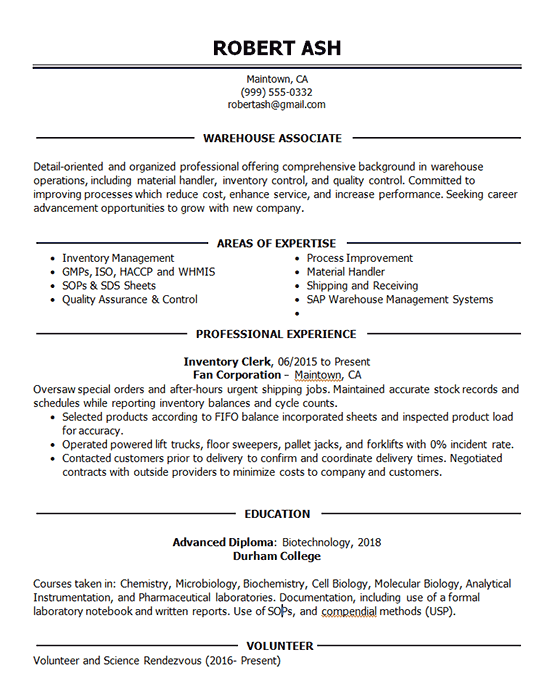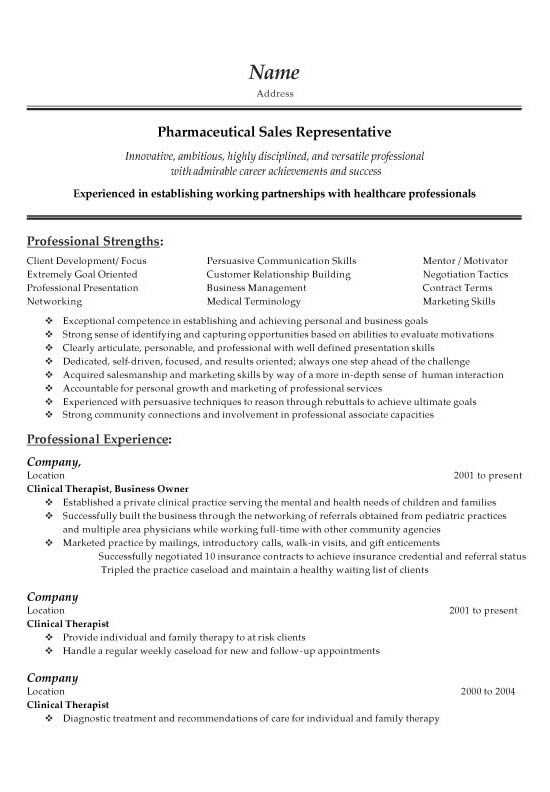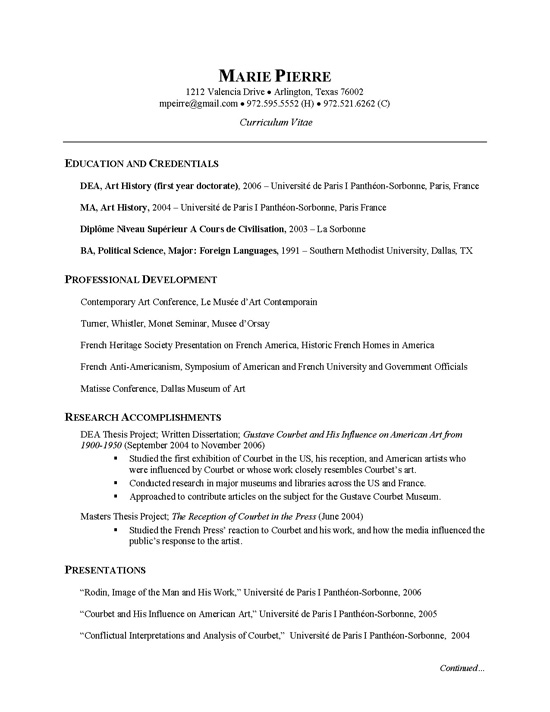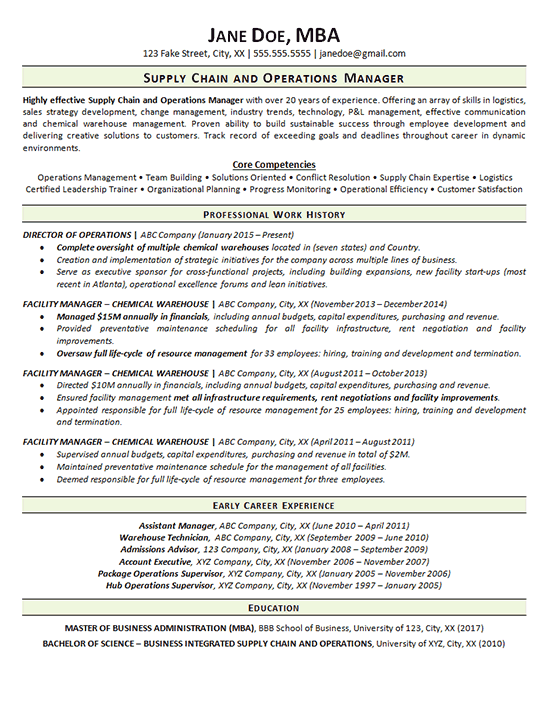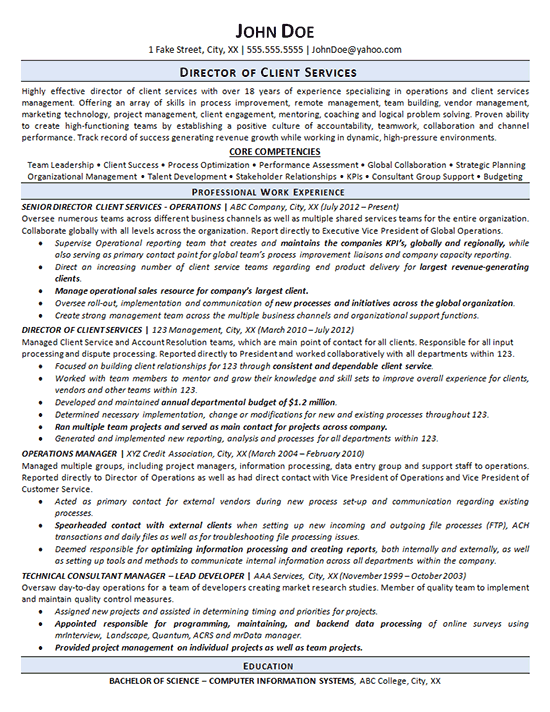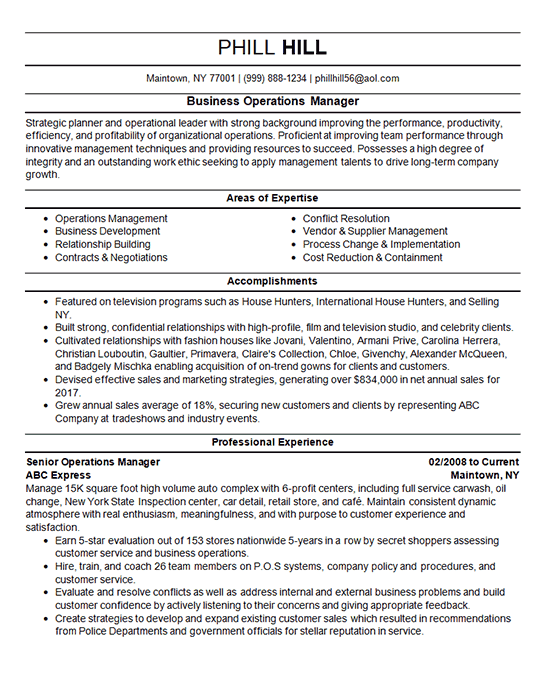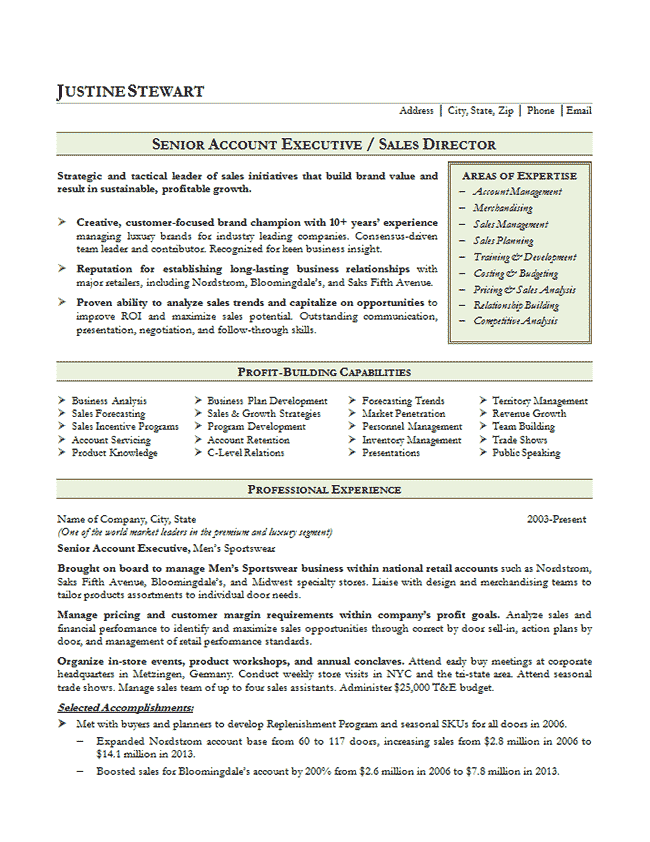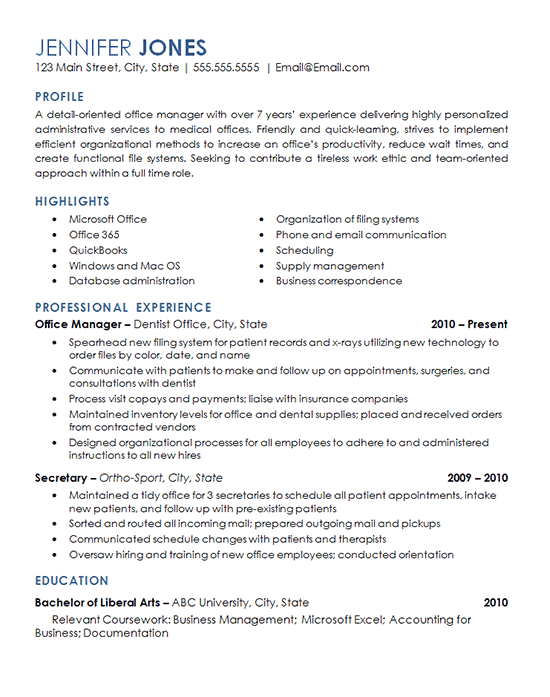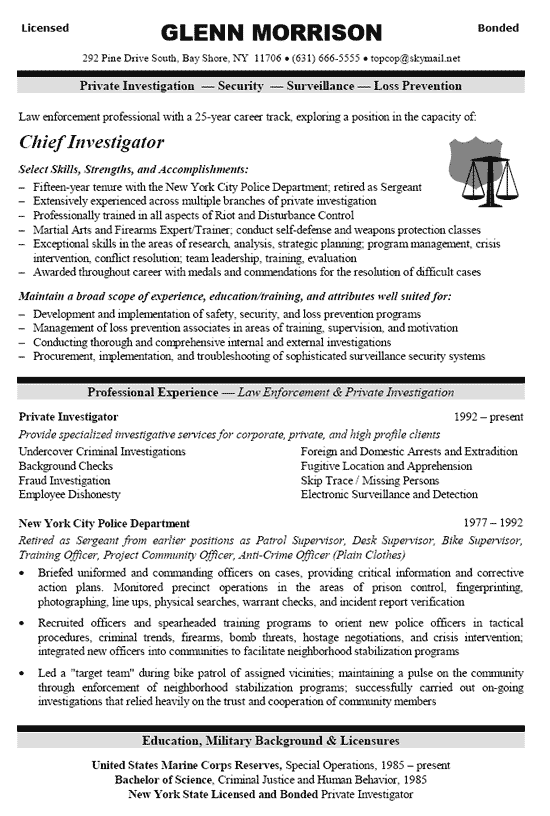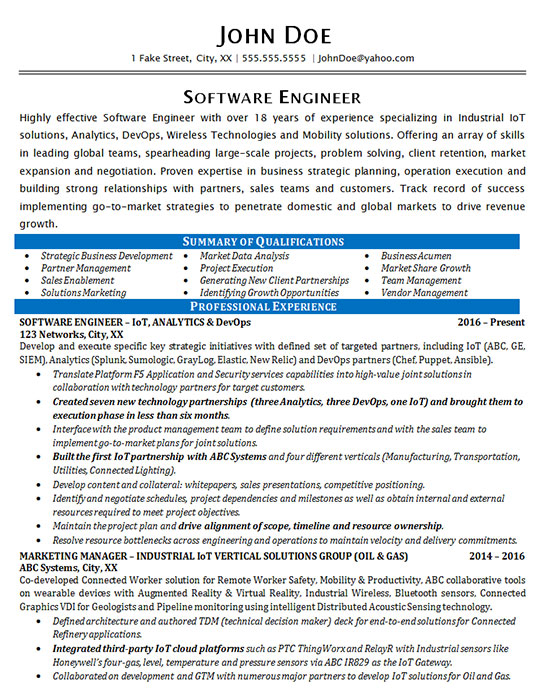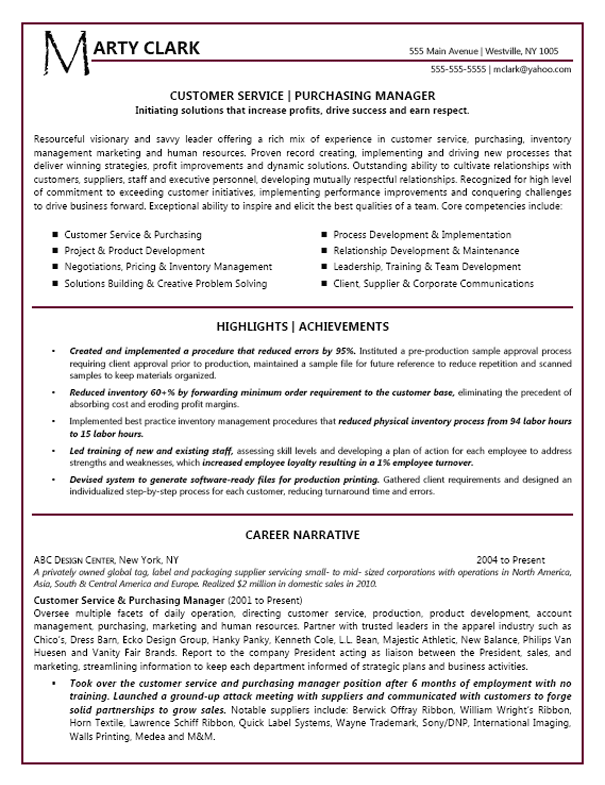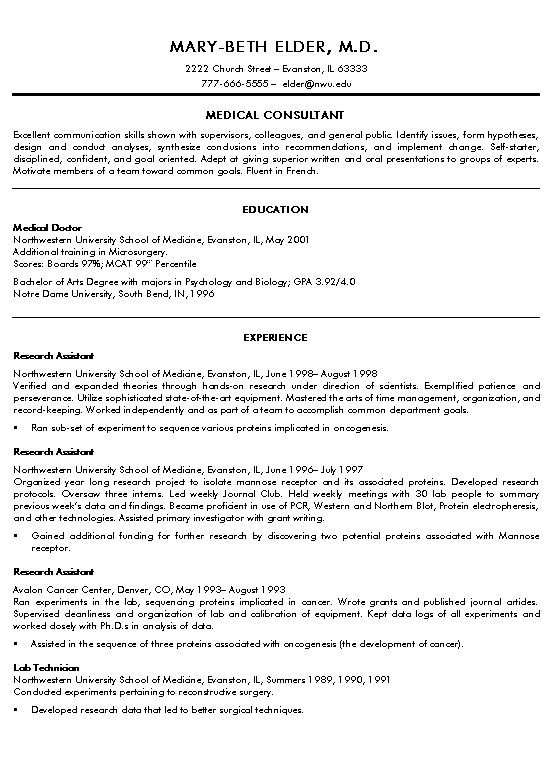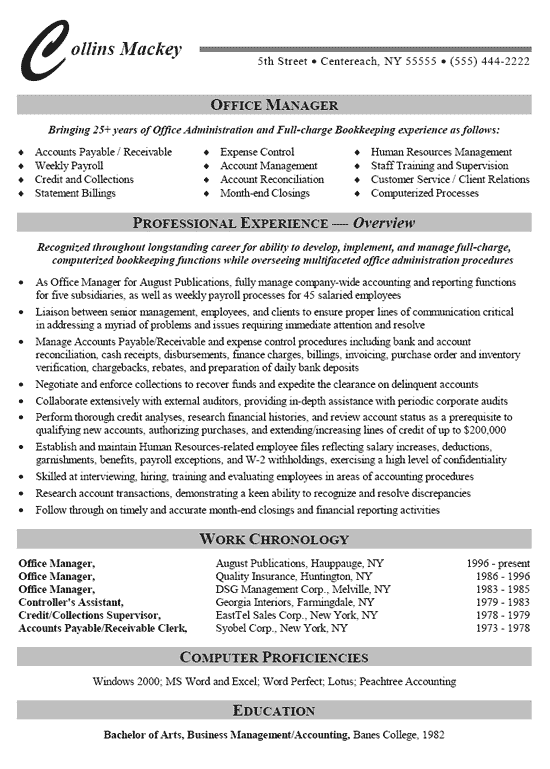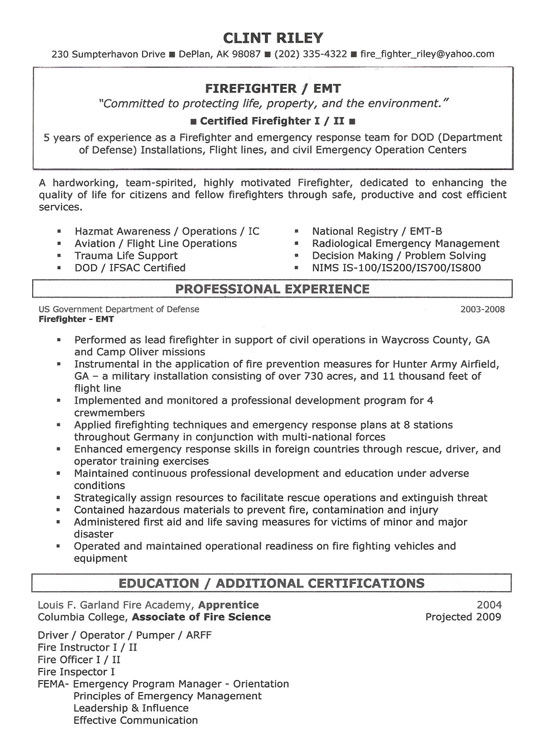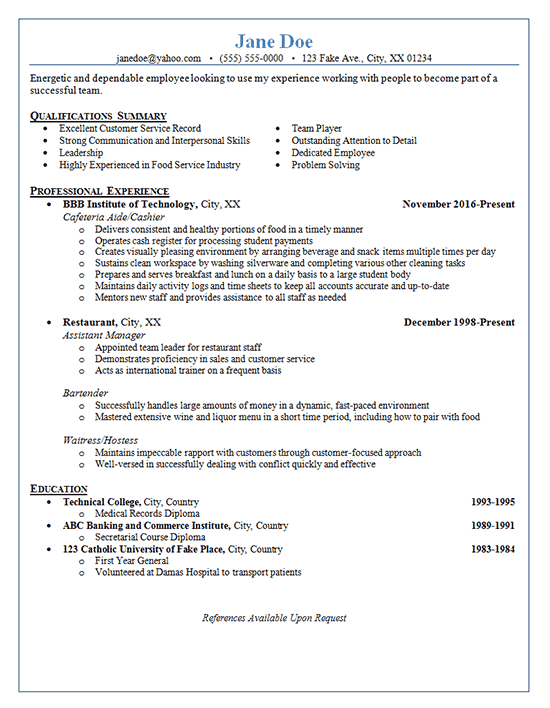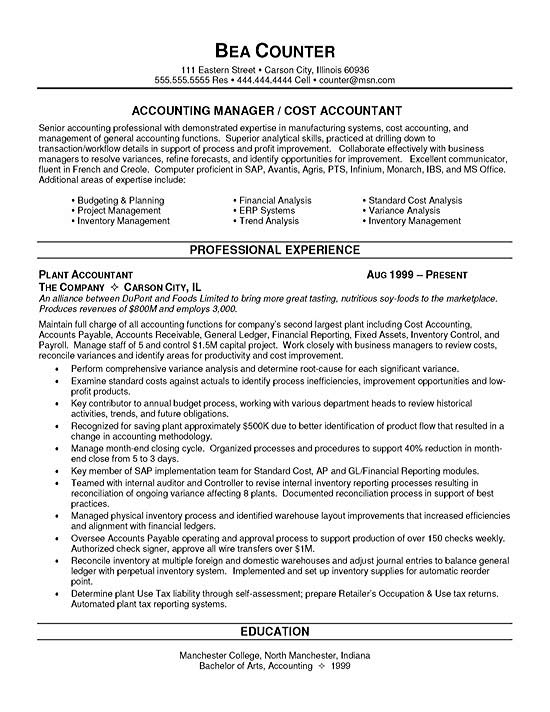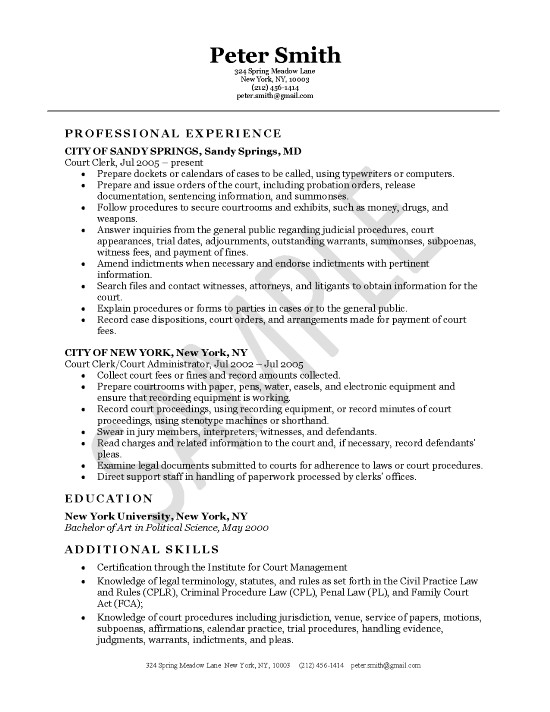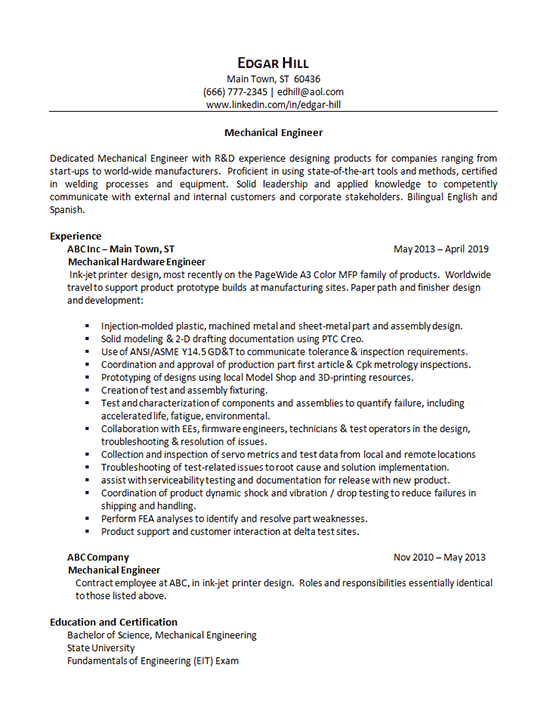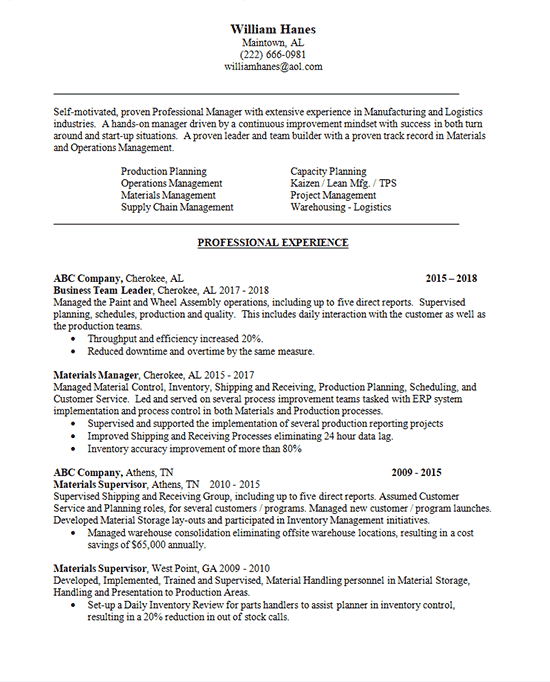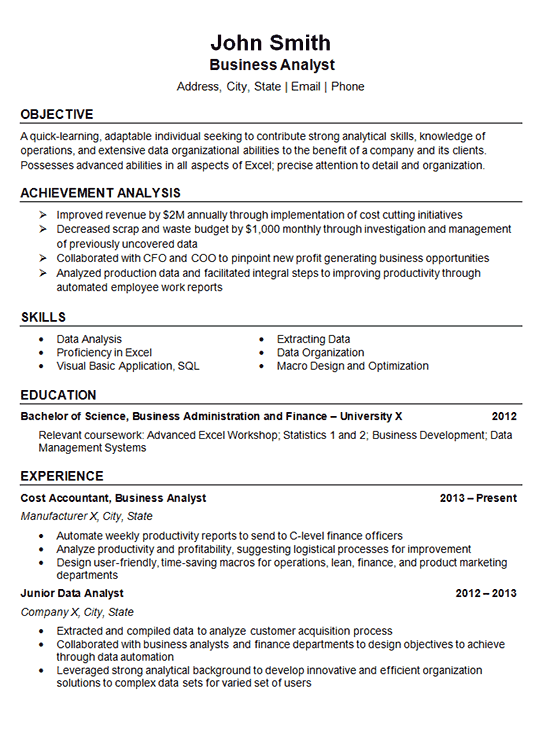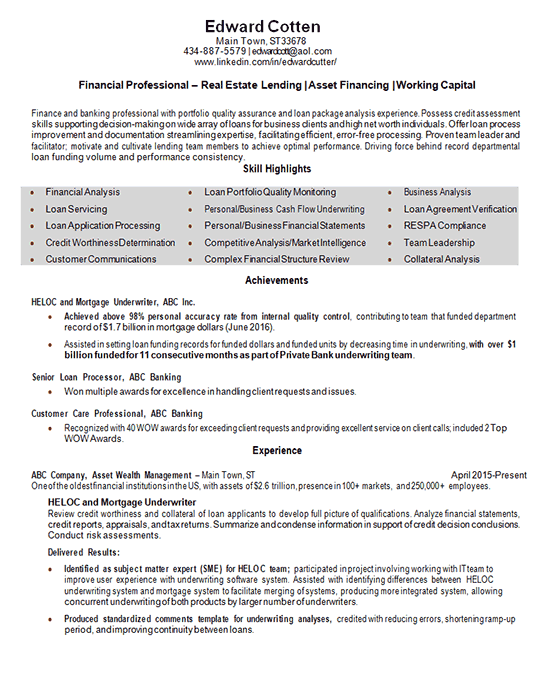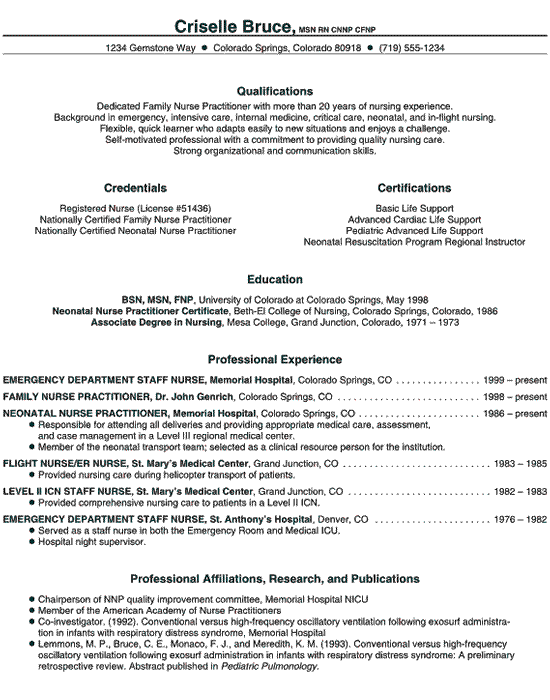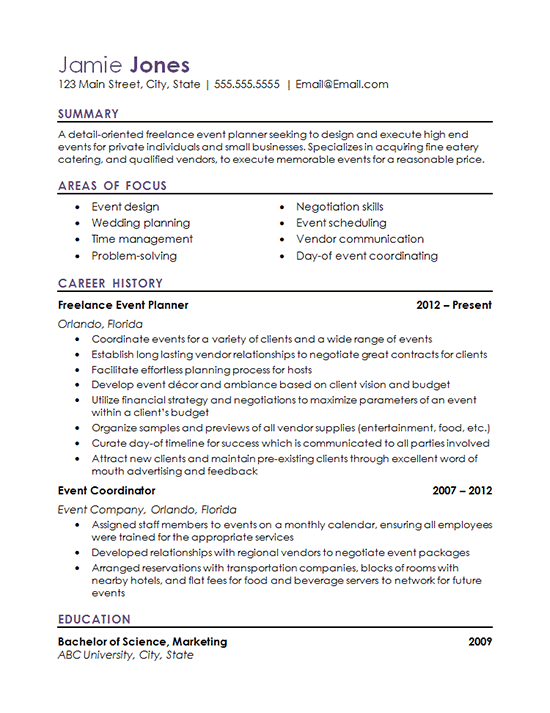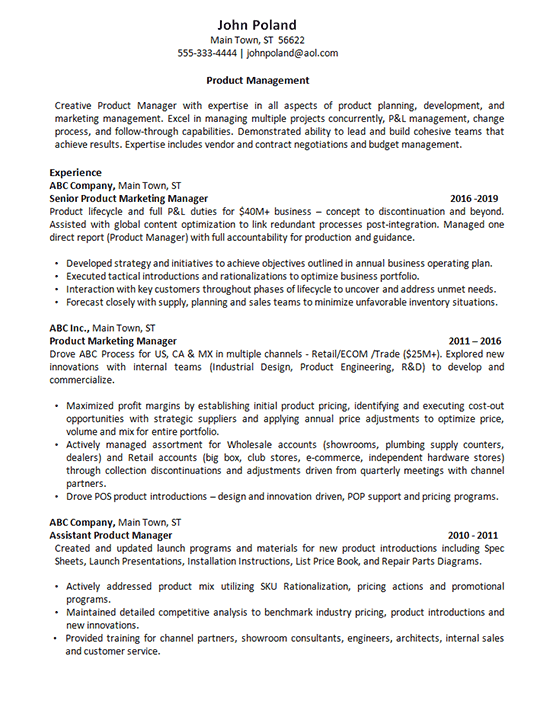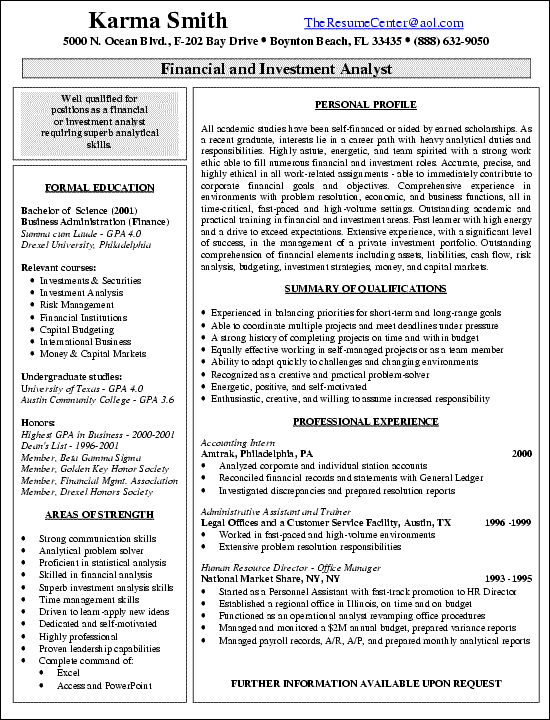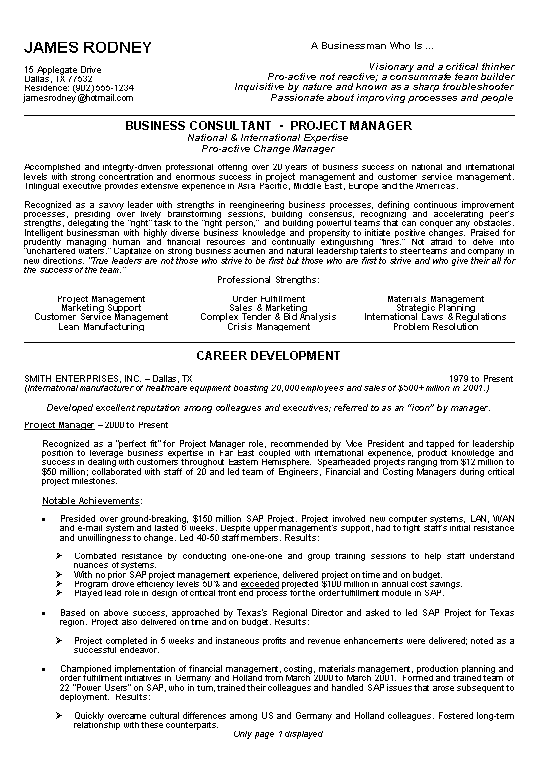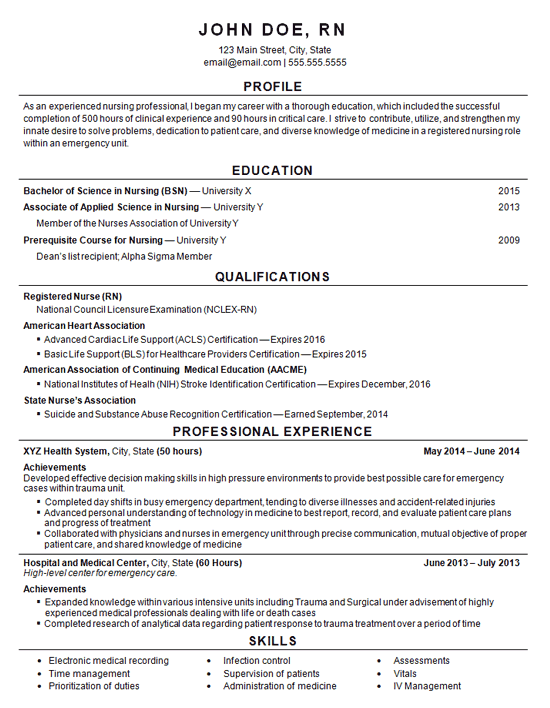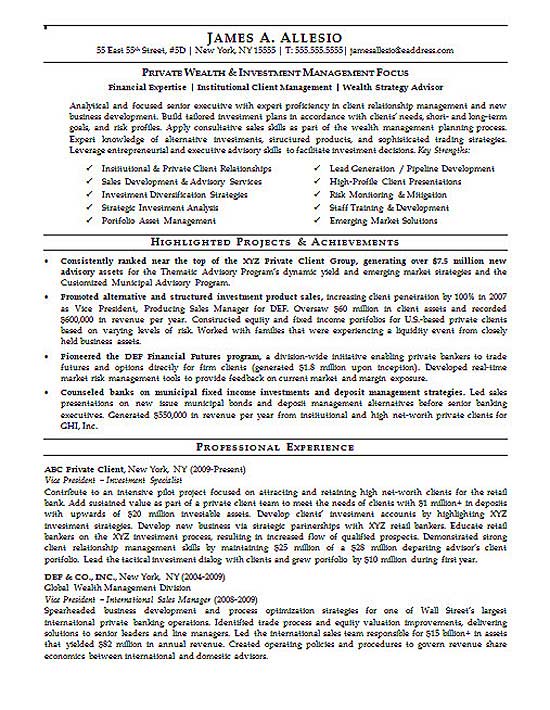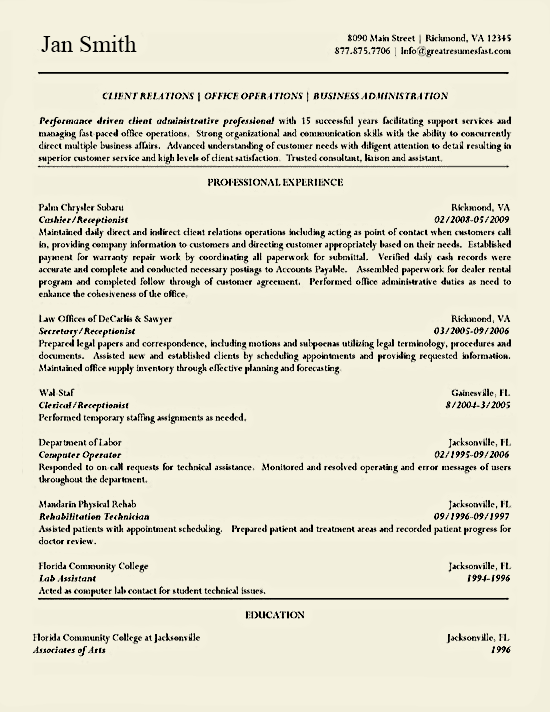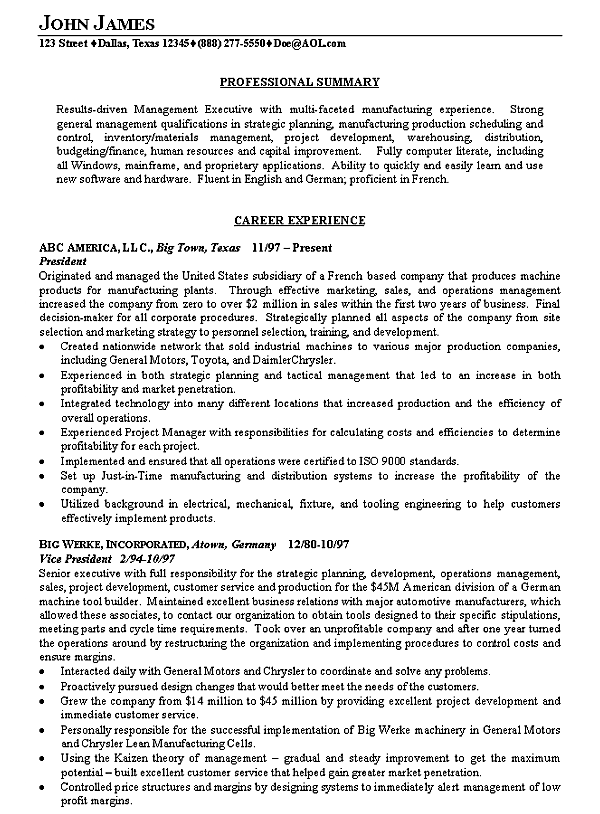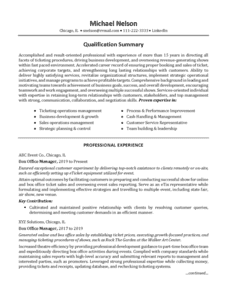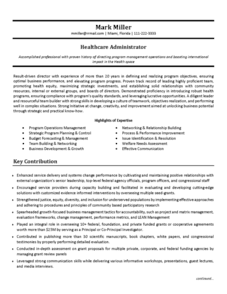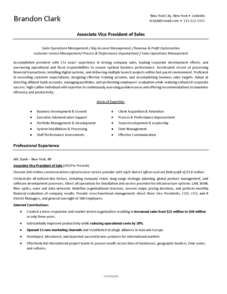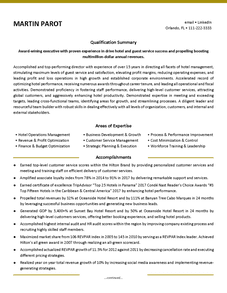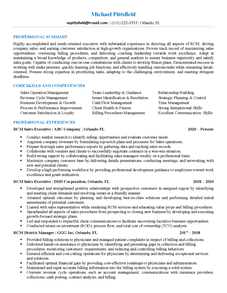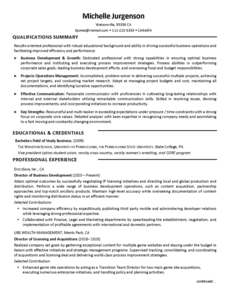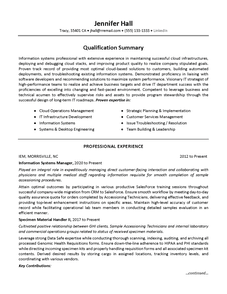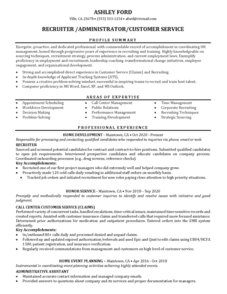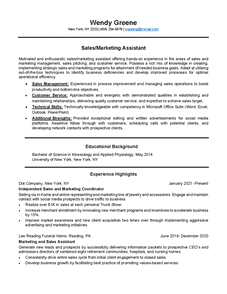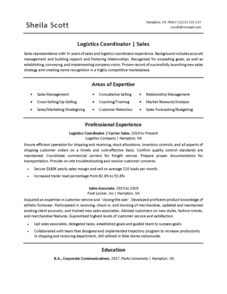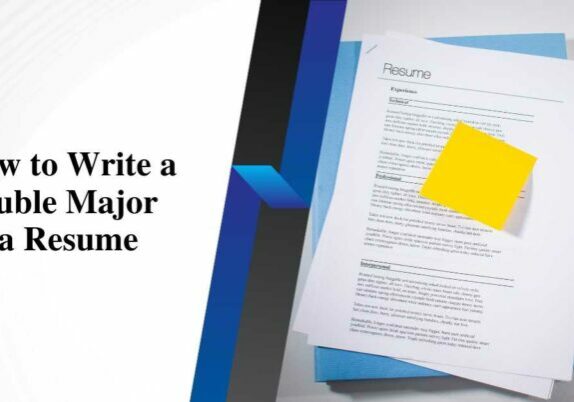This leaderhsip resume was created for a client looking for a position as the Head of Leadership Development. She just began a new job but may have to relocate for personal reasons.
Her experience shows that she has worked in a variety of positions and generally stayed in positions for a few years before moving on. To not have that raise a red flag, we began the resume with a focus on her best qualities and traits. This was accomplished by utilizing an introductory paragraph and summary of qualifications section.
These sections give prospective employers insight into how much this client truly has to offer. From there, her professional experience was listed in detail with the most impactful bullet points written in bold font.
This should help them stand out to the reader so that the focus is on her key accomplishments.
The client’s education, GPA, Minors and Honors were listed next to demonstrate just how impressive her background is in education.
Finally, her technology and software proficiencies were listed so that employers are aware of the widespread skill set encompassed by the client.
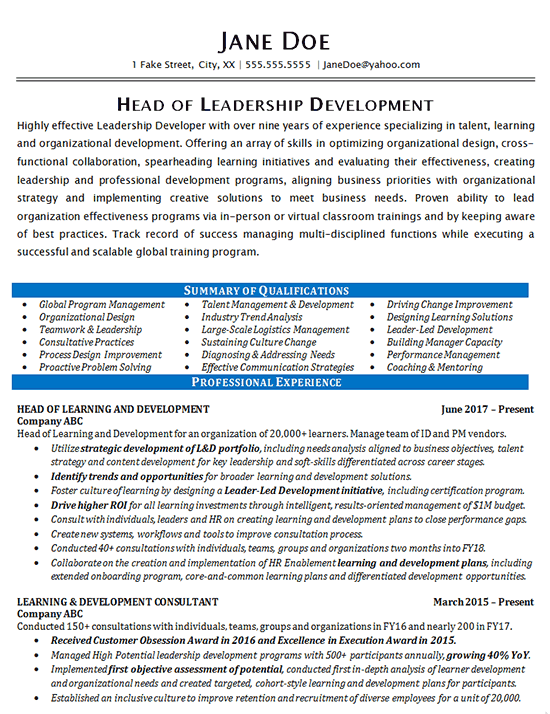
Leadership Development Resume
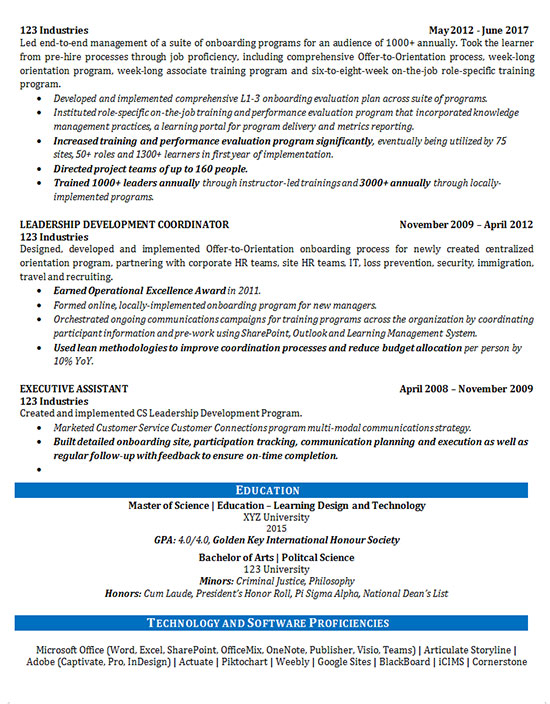
Leadership Development Resume – Page 2
Summary for Leadership Resume
- Highly effective Leadership Developer with over nine years of experience specializing in talent, learning and organizational development.
- Offering an array of skills in optimizing organizational design, cross-functional collaboration, spearheading learning initiatives and evaluating their effectiveness, creating leadership and professional development programs, aligning business priorities with organizational strategy and implementing creative solutions to meet business needs.
- Proven ability to lead organization effectiveness programs via in-person or virtual classroom trainings and by keeping aware of best practices.
- Track record of success managing multi-disciplined functions while executing a successful and scalable global training program.
Leadership Development Resume Experience Statements
- Utilize strategic development of L&D portfolio, including needs analysis aligned to business objectives, talent strategy and content development for key leadership and soft-skills differentiated across career stages.
- Identify trends and opportunities for broader learning and development solutions.
- Foster culture of learning by designing a Leader-Led Development initiative, including a certification program.
- Drive higher ROI for all learning investments through intelligent, results-oriented management of $1M budget.
- Consult with individuals, leaders and HR on creating learning and development plans to close performance gaps.
- Create new systems, workflows and tools to improve the consultation process.
- Conducted 40+ consultations with individuals, teams, groups and organizations two months into FY18.
- Collaborate on the creation and implementation of HR Enablement learning and development plans, including extended onboarding program, core-and-common learning plans and differentiated development opportunities.
Writing a Leadership Resume
Are you looking to stand out in today’s job market? Leadership skills are highly valued in all industries. Whether you’re applying for a management or entry-level role, highlighting your leadership abilities on your resume can help you land the desired job.
But what leadership skills should you focus on? And how can you effectively showcase them to potential employers? In this article, we’ll explore the top leadership skills employers seek, provide tips on highlighting your team leadership abilities, and offer advice on where to include these skills on your resume.
So whether you’re a seasoned manager or just starting in your career, read on to learn how to craft a winning leadership resume.
The 8 Most Crucial Leadership Skills
When creating your resume, you must showcase your ability to set goals, make decisions, and communicate effectively.
Employers also value candidates who can manage their time well, maintain integrity, demonstrate empathy, and possess self-awareness and diplomacy skills.
Highlighting these eight crucial skills in your resume can increase your chances of landing the desired job.
Setting Goals
Setting clear goals is essential for showcasing your abilities and demonstrating your potential to future employers. Setting short-term and long-term goals for yourself and your team members is vital as a leader.
When listing your leadership skills, include specific examples of how you’ve set and achieved goals in previous leadership roles. This could include increasing sales by a certain percentage, improving team productivity, or launching a successful new project.
In addition to including your goal-setting abilities in the work experience section of your resume, it’s also important to highlight your communication skills and other soft skills that make you an effective leader. Employers value leaders who clearly communicate their expectations, foster collaboration among team members, and provide constructive feedback.
By showcasing your leadership skills in both the skills and work experience sections of your resume, you can demonstrate your potential for leadership and leading a team to success.
Making Decisions
You can showcase your ability to make effective decisions by providing specific examples of navigating challenging situations and achieving positive outcomes. When crafting your leadership resume, it’s essential to highlight your decision-making skills as they’re crucial leadership traits.
Ensure you include leadership skills on your resume demonstrating your ability to make sound decisions under pressure. Use quantifiable examples to showcase your decision-making capabilities and how they benefit the company or team.
In addition to highlighting your decision-making skills on your leadership resume, it’s also important to mention them in your cover letter. Hiring managers value candidates who can make effective decisions as it shows their ability to lead and take charge in challenging situations.
By providing specific examples of how you’ve made tough decisions in the past, you can demonstrate your leadership skills and make a favorable impression on the hiring manager. Remember to showcase your ability to make decisions that benefit the team or organization rather than just your personal interests.
Communication
Effective communication is essential for any successful leader, as it allows for clear and concise exchange of ideas within the team or organization. A great leader should possess good listening and interpersonal skills and the ability to effectively articulate their thoughts and ideas. These leadership qualities are crucial in building trust among team members and developing a positive work environment.
As a mentor or team leader, you should encourage open communication and foster teamwork to ensure everyone feels valued and heard.
Moreover, good communication skills are also essential in people management, allowing leaders to give feedback and delegate tasks effectively. As a leader, you should be able to communicate clear expectations and provide constructive criticism to improve performance.
Effective communication also plays a crucial role in strategic planning and decision-making, enabling leaders to convey their vision and goals to the team and gain their buy-in.
Overall, mastering the art of communication is a crucial aspect of leadership and can help you inspire, motivate, and lead your team toward success.
Managing Time
Mastering time management is crucial for leaders to prioritize tasks and achieve their goals effectively. As you create your leadership resume, highlight your strong leadership skills in managing time. Employers value individuals who can effectively manage their time and those of their team members.
In your work experience section, include examples of how you’ve utilized your organizational skills to manage projects and deadlines. Show how your problem-solving skills have helped you overcome challenges and succeed within a given timeline. Additionally, emphasize your time management skills by showcasing how you’ve efficiently allocated time to complete tasks and projects.
Demonstrating these skills on your leadership resume will show you’re reliable and effective.
Integrity
As you strive to showcase your integrity on your resume, don’t underestimate the power of honesty and trust in building solid relationships with colleagues and clients. Honesty and trustworthiness are essential that will make you stand out.
But it’s not enough to list these traits on your skills list; you must also demonstrate them in your experience section. One way to showcase your integrity is by highlighting your self-awareness and ability to take responsibility for your actions. When you make a mistake, own up to it and show how you learned from the experience. This will demonstrate your honesty and willingness to learn and grow.
Additionally, use simple and transparent language in your leadership resume and cover letter. This will show potential employers that you value integrity and are committed to building solid relationships with colleagues and clients.
Empathy
Put yourself in the shoes of your colleagues and clients by showing empathy in your experience section. Highlight times when you were able to understand and respond to their needs. As a leader, it’s essential to have heart, and it helps you build relationships and communicate effectively with your team.
When including your team leadership skills, consider adding examples of how you’ve shown empathy in the workplace. For instance, you could mention how you’ve taken the time to listen to your colleagues’ concerns, helped them navigate their challenges, or provided support when needed.
Moreover, self-awareness and delegation are essential skills that go hand in hand with empathy. As a leader, you must know your strengths and weaknesses and delegate tasks accordingly. Doing so lets you focus on what you’re good at and let others shine in their respective areas.
Additionally, delegating tasks shows that you trust your team and value their skills and expertise. When listing skills examples for your resume, including delegation and empathy. Employers highly seek these skills, and highlighting them on your resume can help you stand out.
Self-Awareness
Get to know yourself better and improve your chances of landing a job by highlighting your self-awareness skills on your leadership resume. This is a crucial skill required for effective leadership, and it involves understanding your strengths, weaknesses, and values and how your actions and behaviors impact others.
When you’re self-aware, you can better manage yourself and your relationships with others, which makes you a more effective leader. To improve your leadership skills, reflect on your skills and qualities. List examples of times when you’ve exhibited self-awareness professionally and personally. This will help you identify areas where you excel and areas where you could improve.
Critical takeaways for making a good leader include adapting to change, being accountable, and checking back on progress. By highlighting these skills on your leadership resume, you can show that you possess the qualities and skills required to be an effective leader.
Diplomacy
Navigating sensitive situations gracefully and tactfully is crucial for building strong professional relationships and highlighting your diplomacy skills on your job application.
As a leader, you may encounter conflicts within your team or with clients and stakeholders. Your ability to handle these situations with diplomacy can make all the difference in resolving them effectively. Diplomacy involves actively listening to others, understanding their perspectives, and finding mutually beneficial solutions. It also consists in being respectful, patient, and composed in adversity.
Regarding leadership skills for a resume, highlighting your diplomacy abilities can show that you have the skills needed to manage a team and work collaboratively with others. Technical skills and organizational abilities are essential, but handling difficult situations with diplomacy can be just as valuable.
Your skillset should demonstrate problem-solving and your ability to communicate effectively and build relationships. By emphasizing your diplomacy skills, you can show potential employers that you have the leadership skills they’re looking for and can help their organization thrive.
What Skills and Qualities Help You Highlight Your Team Leadership Skills?
To showcase your team leadership skills, you’ll want to highlight qualities such as adaptability, accountability, and communication in a way that resonates with potential employers.
Being adaptable means that you can adjust to any changes that may occur and still maintain focus on the end goal.
Accountability is crucial in leadership because it shows that you are responsible and can be trusted to handle projects.
Communication skills are also vital in leadership, as you need to convey your ideas and listen to feedback from your team.
When listing leadership skills on a resume, you should provide specific examples of how you demonstrated these skills in your previous positions. Use bullet points to make it easy for the hiring manager to see exactly what you accomplished.
There are many types of leadership, so make sure to tailor your examples to the specific kind of leadership needed for the job you are applying for.
To improve your leadership skills, consider taking courses or workshops, reading books on leadership, or seeking out a mentor in your field.
And remember, you don’t have to be a manager to be a leader. Innovative ideas and a willingness to take the initiative can demonstrate leadership skills even in entry-level positions.
So, be sure to highlight these qualities in your resume and cover letter to showcase your potential as a team leader.
How Can You Demonstrate Leadership Qualities on Your Academic Job Resume?
Showcasing your ability to lead and inspire others can set you apart on your academic job application, allowing you to stand out as a shining star among a sea of applicants.
When creating your leadership resume, use a professional template that aligns with the job you’re applying for. This will help you present yourself clearly and concisely, making it easier for the hiring manager to see your skills and qualities.
Next, focus on listing specific examples of your leadership skills. Highlight your problem-solving abilities and ability to work collaboratively. Include a list of criteria demonstrating your leadership skills, such as how you successfully managed a team project or motivated your colleagues to reach a common goal. You can showcase your ability to lead and inspire others by presenting concrete examples of your leadership skills.
In conclusion, when crafting your leadership resumes for an academic job, it’s important to focus on the skills and qualities that make you a strong leader. Use a professional template, list specific leadership skills examples, and highlight the key takeaways that make you stand out. Doing so demonstrates your ability to lead and inspire others, making you a top candidate for any academic job.
Where To Include Leadership Skills on Your Resume
Knowing where to highlight your skills is crucial to present yourself as a standout candidate when crafting your job application.
Leadership skills matter whether you’re applying for jobs requiring management positions. Fortunately, several ways exist to develop and use your skills on your resume.
Firstly, read the job ad carefully and identify the skills the employer seeks. This’ll help you tailor your resume to the specific needs of the company and team.
Secondly, focus on becoming a great leader by developing leadership qualities and inspiring others. Some necessary leadership skills include communication, creativity, problem-solving, adaptability, emotional intelligence, and time management.
Lastly, don’t just list your leadership skills in the skills section of your resume. Use the employment history section to back up your achievements and show how you have applied your leadership skills in past roles. Highlight specific examples where you demonstrated leadership, such as leading a successful project or mentoring a team member. By doing so, you’ll show that you have the abilities and experience companies value when it comes to leadership.
Frequently Asked Questions
If you’re wondering how to develop leadership skills in your current job, start by taking the initiative and showing a willingness to learn and take on new responsibilities.
Use power words like ‘managed,’ ‘led,’ and ‘coordinated’ to showcase your leadership experience and skills.
To improve practical leadership skills, seek feedback from colleagues and supervisors, take courses or attend workshops, and practice active listening and effective communication.
How Can You Develop Leadership Skills in Your Current Job?
Looking to boost your career potential? Developing leadership skills in your current job is a great place to start.
One way to showcase your leadership potential is by stepping up as a team lead or taking responsibility for organizing and managing projects. This not only helps in achieving company goals but also highlights your ability to motivate and inspire others.
Another way to develop leadership skills is by seeking opportunities for growth and learning. Attend industry conferences, take on new challenges, and seek feedback from colleagues and superiors.
Consistently improving your skills will benefit your current job and make you a valuable asset to any future employer. Remember, these skills are about managing people and being a visionary, strategic thinker, and problem solver.
Which Power Words Should You Use?
Now that you know how to develop your leadership skills, let’s focus on how to highlight them on your resume. As a certified professional resume writer, I can tell you that using power words is essential in showcasing your top leadership skills.
Words like ‘developing and managing,’ ‘motivating,’ and ‘taking responsibility’ are great examples of power words that can demonstrate your abilities. However, it’s not enough to use these words.
You need to quantify your achievements and show how you used your leadership skills to make a positive impact. For example, instead of simply stating that you ‘organized a team project,’ you could say that you ‘organized a team of 10 members, resulting in a 20% increase in productivity and on-time delivery of the project’.
By quantifying your accomplishments, you show the real impact you can make with your leadership skills.
How Can I Find Ways To Improve or Develop Effective Leadership Skills?
Discovering avenues for enhancing one’s leadership abilities can significantly enhance the potential for professional success. One way to improve your leadership skills is to seek opportunities to manage and organize projects or teams. This can be done within your current job or by volunteering for leadership roles in the community or extracurricular activities.
By taking on these responsibilities, you can develop your ability to motivate and inspire others and hone your project management and team coordination skills. Another critical aspect of effective leadership is people management, which involves developing emotional intelligence, communication, and delegation skills.
To improve in these areas, seek feedback from colleagues and superiors and actively work to implement their suggestions. Additionally, seek out resources such as books, courses, or mentors that can guide effective leadership techniques.
Key Takeaways
Remember, as you prepare for your job search, employers value different skills depending on their culture and needs, and it’s essential to tailor your abilities to fit the specific company and team. Before applying for a management position, evaluate your personal and professional experience to determine which leadership skills you possess. From there, identify areas for improvement and actively work on taking responsibility, organizing, motivating, and quantifying your achievements.
One key takeaway is that communication is another skill, including written skills, listening, influencing, and delegation. Another essential leadership aspect is adaptability, accountability, and checking back on progress.
Creativity, planning, people management, emotional intelligence, problem-solving, visionary leadership, strategic thinking, collaboration, and time management are all important skills for a successful leader.
Remember, your leadership resume skills section is not the most effective place to show leadership skills. Instead, use the employment history section to back up your achievements and demonstrate your leadership abilities. Hiring managers value leadership skills, so highlight them throughout your resume and cover letter.
Finally, a successful job search requires preparation before writing the leadership resume, so take the time to evaluate your skills and experiences to ensure that you’re presenting yourself as a strong leader.
Conclusion
Now that you understand the importance of showcasing your leadership skills on your resume, you may think, “But I don’t have any formal leadership experience!” Don’t worry; you don’t need a fancy title to demonstrate your leadership abilities.
Think about when you took charge of a project, offered guidance to a coworker, or successfully led a team to complete a task. These are all examples of leadership in action. By highlighting these experiences and the skills you utilized, you can show potential employers that you have what it takes to be a valuable leader in their company.
Remember, leadership isn’t just about having a title or position of authority. It’s about inspiring, motivating, and guiding others toward a common goal. So don’t be afraid to showcase your leadership skills, even if you’ve never held a formal leadership role.
With the right approach, you can prove you have what it takes to be a successful leader.

